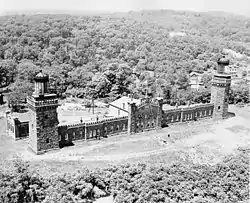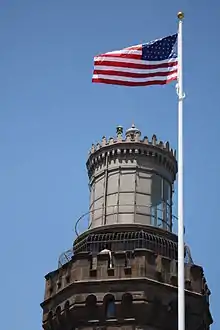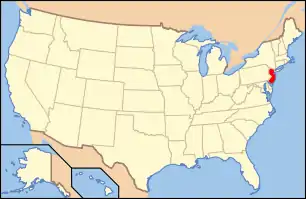Navesink Twin Lights
The Navesink Twin Lights is a non-operational lighthouse and museum located in Highlands, Monmouth County, New Jersey, United States, overlooking Sandy Hook Bay, the entrance to New York Harbor, and the Atlantic Ocean. The Twin Lights, as the name implies, are a pair of beacons located 246 feet (75 m) above sea level on the headlands of the Navesink Highlands.
.jpg.webp) The historic Twin Lights of Highlands, New Jersey, U.S. | |
| Location | Highlands, New Jersey |
|---|---|
| Coordinates | 40°23′46.4″N 73°59′8.8″W |
| Constructed | 1862 |
| Automated | 1949 |
| Power source | lard, kerosene, electricity |
| Heritage | National Register of Historic Places listed place, National Historic Landmark |
| Light | |
| First lit | 1862 |
| Deactivated | 1898 (north tower); 1952 (south tower) north tower relit in 1962 |
| Lens | sixth order Fresnel lens |
Navesink Light Station | |
 Navesink Light Station | |
| Architect | Joseph Lederle |
| NRHP reference No. | 70000389[1] Twin Lights 06000237[2] Landmark |
| NJRHP No. | 1980[3] |
| Significant dates | |
| Added to NRHP | December 2, 1970 |
| Designated NHLD | February 17, 2006[4] |
| Designated NJRHP | September 11, 1980 |
In 1962, the State of New Jersey acquired Twin Lights. At the current museum facility, tours of the lighthouse, a climb of the North Tower and its expansive ocean view, and a view of the lighthouse equipment, await visitors. Twin Lights is listed on the State and National Register of Historic Places, and was designated a National Historic Landmark in 2006 for its architecture and its role in the development of lighthouse technologies.[5]
The Twin Lights State Historic Site is part of the New Jersey Coastal Heritage Trail Route.
History

A lighthouse existed on the site since 1828, when it became an important guide and landmark for ships navigating the treacherous entrances to New York Harbor.
The current lighthouse was constructed in 1862. The non-identical towers by day and the two beacons by night—one flashing and one fixed—allowed ready identification by mariners of the identity of the facility, thus allowing a rough determination of their location approaching the harbor.
This was the first American lighthouse to test a Fresnel lens and was also the site of a demonstration by Marconi of the wireless telegraph in 1899.[6] A bi-valve fresnel lens is on display in the museum.[7]
The north tower light was discontinued in 1898; at the same time the south tower was electrified, one of the first lighthouses in the United States to do so. It was automated in 1949, but was discontinued in 1952 as the importance of the light diminished.
In 1962, the site was turned over to the state of New Jersey, by the Borough of Highlands.[8] The sixth order lens was previously acquired and installed in the north tower by the Shrewsbury Power Squadron and presented to the town which reactivated the north tower as a private aid to navigation. This light remains active.
References
- "National Register Information System". National Register of Historic Places. National Park Service. July 9, 2010.
- "National Register Information System". National Register of Historic Places. National Park Service. January 23, 2007.
- "New Jersey and National Registers of Historic Places - Monmouth County" (PDF). New Jersey Department of Environmental Protection - Historic Preservation Office. November 22, 2013. p. 5. Archived from the original (PDF) on October 16, 2014.
- "Navesink Light Station". National Historic Landmark summary listing. National Park Service. June 23, 2008. Archived from the original on February 25, 2009.
- "Navesink Light Station – National Historic Landmark Nomination". National Park Service.
- "Twin Lights NHL Dedication". Archived from the original on September 6, 2008. Retrieved October 5, 2008.
- "Ricks Lighthouses". Archived from the original on October 5, 2008. Retrieved October 5, 2008.
- 0MB No. 1024-0018 NAVESINK LIGHT STATION United States Department of the Interior, National Park Service Page 20 National Register of Historic Places Registration Form
External links
- Lighthouses of New York Harbor - Navesink Twin Lights Archived 2006-06-13 at the Wayback Machine
- Navesink Lighthouse and Robbins Reef Lighthouse: Lighting the Way Through New York Bay, a National Park Service Teaching with Historic Places (TwHP) lesson plan
- "Navesink Light Station – National Historic Landmark Nomination". National Park Service.

